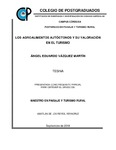| dc.contributor.author | Vázquez Martín, Ángel Eduardo | |
| dc.creator | VÁZQUEZ MARTÍN, ÁNGEL EDUARDO; 785907 | |
| dc.date.accessioned | 2019-05-22T18:04:43Z | |
| dc.date.available | 2019-05-22T18:04:43Z | |
| dc.date.issued | 2018-09 | |
| dc.identifier.uri | http://hdl.handle.net/10521/3230 | |
| dc.description | Tesina (Maestría en Ciencias, especialista en Paisaje y Turismo Rural).- Colegio de Postgraduados, 2018. | es_MX |
| dc.description.abstract | En 2016, México fue el tercer productor de alimentos en América Latina y el décimo segundo en el planeta. La variedad de agroalimentos que se han identificado suman 1500 especies vegetales comestibles, son un legado cultural e integran parte del acervo gastronómico. En ese mismo año, el país obtuvo ingresos en el sector turístico por 19,600 millones de dólares; situándolo en el 14° lugar del ranking mundial en ingresos por ese rubro. Se seleccionó la ciudad de Orizaba, Veracruz, con el reconocimiento oficial de Pueblo Mágico, para evaluar el potencial de los alimentos autóctonos como recurso turístico. Este trabajo se organizó en tres etapas, en la primera se identificaron los alimentos objetivo; posteriormente se analizó el interés que generan en el turista y finalmente se propuso una estrategia productiva para su valoración comercial. Se registraron y clasificaron 40 agroalimentos autóctonos con su temporalidad, forma de consumo, origen y lugar de venta; 83 % de los potenciales turistas que visitarían la ciudad de Orizaba se interesaron en el conocimiento y consumo de los alimentos locales. Los comerciantes de estos productos comparten su acervo y muestran la necesidad de valorarlo y recuperarlo. Se requieren investigaciones que evalúen la aportación de este recurso natural al desarrollo de las comunidades rurales y al fortalecimiento del turismo interno. El turismo puede inferir como una alternativa para proponer políticas de valoración, reconocimiento y recuperación de los agroalimentos autóctonos y la diversificación productiva. _______________ THE AUTOCHTHONOUS AGRO FOODS AND ITS VALORATION IN THE TOURISM. ABSTRACT: In 2016, Mexico was the third largest food producer in Latin America and the twelfth in the world. The variety of agrifoods that have been identified add 1500 edible plant species, are a cultural legacy and part of the gastronomic heritage. In that same year, the country obtained income in the tourism sector for 19,600 million dollars; placing it in the 14th place in the world ranking in income for that item. The city of Orizaba, Veracruz, was selected with the official recognition of “Pueblo Mágico”, to evaluate the potential of autochthonous foods as a tourist resource. This work was organized in three stages, in the first the target foods were identified; later, the interest generated in the tourist was analyzed and finally a productive strategy was proposed for its commercial valuation. 40 autochthonous agroalimentos with their temporality, form of consumption, origin and place of sale, were registered and classified. 83 % of the potential tourists that would visit the city of Orizaba were interested in the knowledge and consumption of local foods. The merchants of these products share their heritage and show the need to value it and recover it. Research is required to evaluate the contribution of this natural resource to the development of rural communities and the strengthening of domestic tourism. Tourism can be inferred as an alternative to propose policies of valuation, recognition and recovery of autochthonous agrifoods and productive diversification. | es_MX |
| dc.description.sponsorship | Consejo Nacional de Ciencia y Tecnología (CONACyT). | es_MX |
| dc.format | pdf | es_MX |
| dc.language.iso | spa | es_MX |
| dc.rights.uri | http://creativecommons.org/licenses/by-nc-nd/4.0 | es_MX |
| dc.subject | Turismo | es_MX |
| dc.subject | Recurso turístico | es_MX |
| dc.subject | Autochthonous agro-food | es_MX |
| dc.subject | Tourism | es_MX |
| dc.subject | Tourist resource | es_MX |
| dc.subject | Agroalimento autóctono | es_MX |
| dc.subject | Paisaje y Turismo Rural | es_MX |
| dc.subject | Maestría | es_MX |
| dc.subject.classification | CIENCIAS SOCIALES::CIENCIAS ECONÓMICAS::ECONOMÍA SECTORIAL::ECONOMÍA SECTORIAL. TURISMO | es_MX |
| dc.title | Los agroalimentos autóctonos y su valoración en el turismo. | es_MX |
| dc.type | Tesis | es_MX |
| Tesis.contributor.advisor | Ávalos de la Cruz, Dora Angélica | |
| Tesis.contributor.advisor | Servín Juárez, Roselia | |
| Tesis.contributor.advisor | Cadena Íñiguez, Jorge | |
| Tesis.contributor.advisor | García García, Carlos Gilberto | |
| Tesis.date.submitted | 2018 | |
| Tesis.date.accesioned | 2019 | |
| Tesis.date.available | 2019 | |
| Tesis.format.mimetype | pdf | es_MX |
| Tesis.format.extent | 6,911 KB | es_MX |
| Tesis.subject.nal | Agroturismo | es_MX |
| Tesis.subject.nal | Farm tourism | es_MX |
| Tesis.subject.nal | Gastronomía | es_MX |
| Tesis.subject.nal | Gastronomy | es_MX |
| Tesis.subject.nal | Alimentos tradicionales | es_MX |
| Tesis.subject.nal | Traditional foods | es_MX |
| Tesis.subject.nal | Cultivos étnicos | es_MX |
| Tesis.subject.nal | Ethnic crops | es_MX |
| Tesis.subject.nal | Orizaba, Veracruz, México | es_MX |
| Tesis.rights | Acceso abierto | es_MX |
| Articulos.subject.classification | Turismo-México | es_MX |
| dc.type.conacyt | masterThesis | es_MX |
| dc.identificator | 5||53||5312||531290 | es_MX |
| dc.contributor.director | ÁVALOS DE LA CRUZ, DORA ANGÉLICA; 35490 | |
| dc.audience | generalPublic | es_MX |


